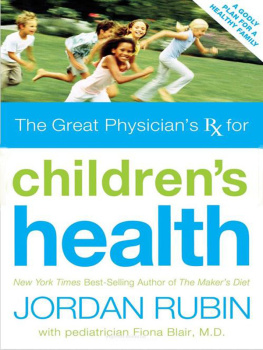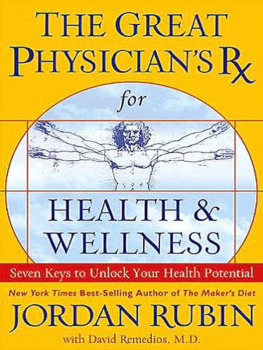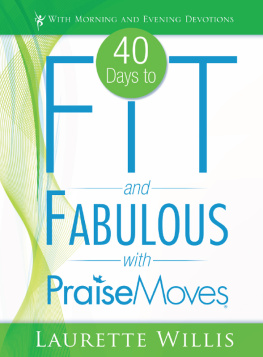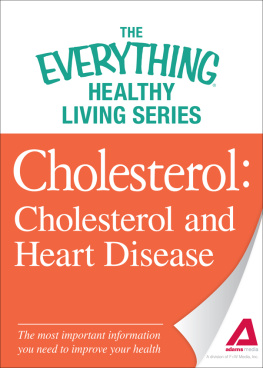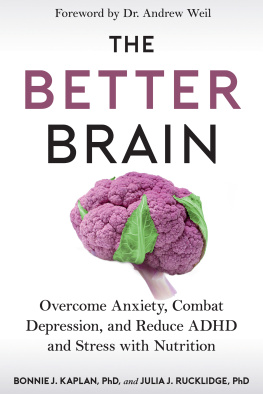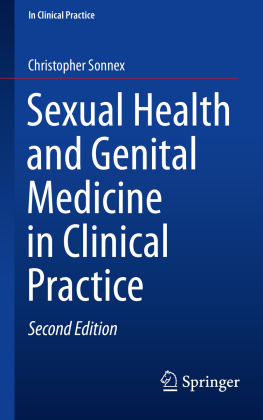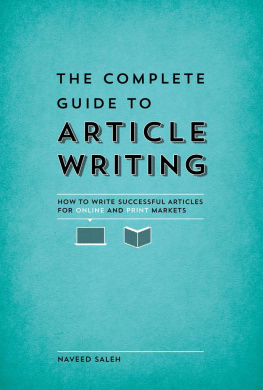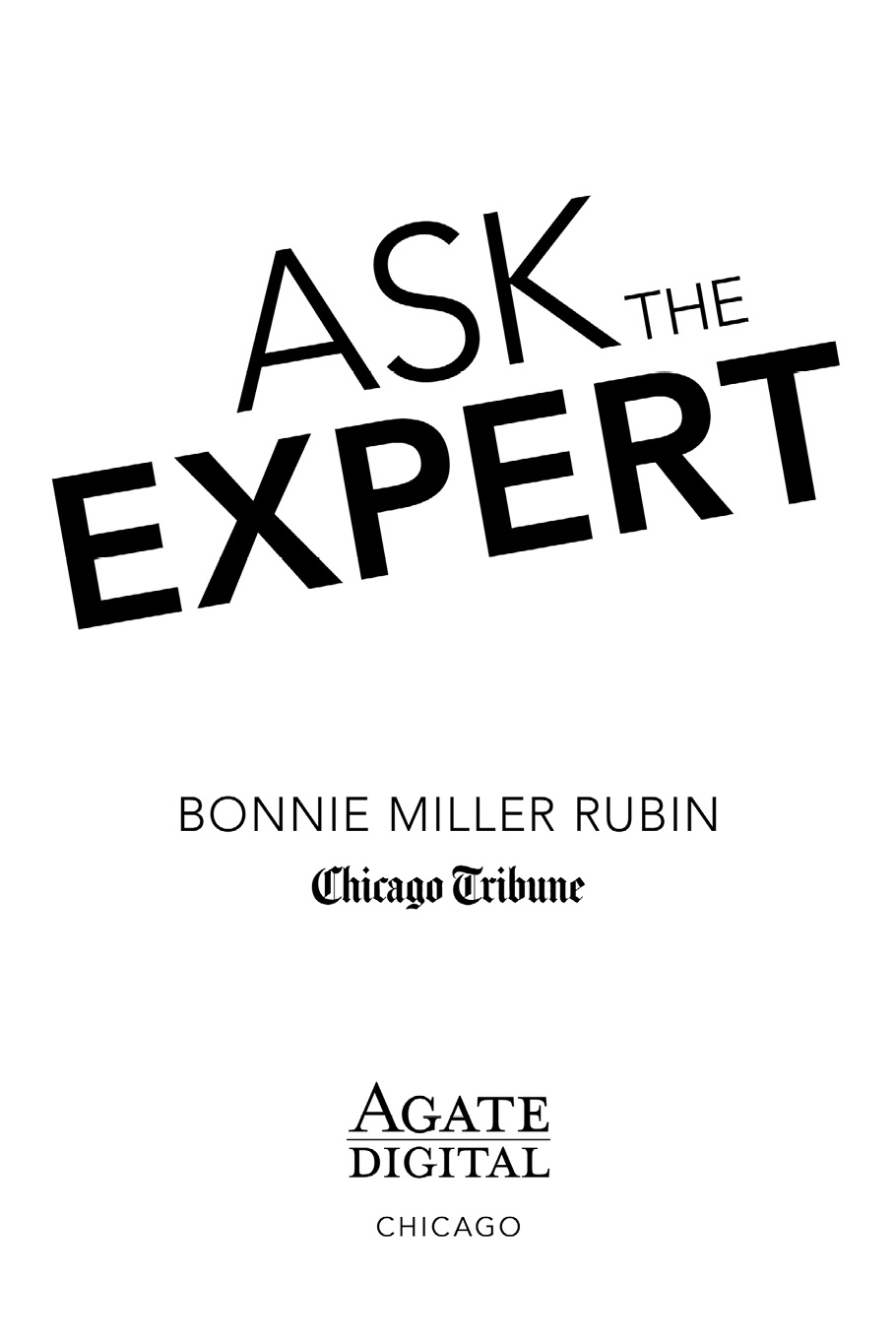Ask the Expert
Tips on Health, Parenting, Nutrition and More from Specialists and Medical Experts
Copyright 2015 by the Chicago Tribune
All rights reserved. No part of this book may be reproduced or transmitted in any form or by any means, electronic or mechanical, including copying, recording, or by any information storage and retrieval system, without express written permission from the publisher.
Tony W. Hunter, CEO & Publisher
Gerould W. Kern, Senior Vice President, Editor
Peter Kendall, Managing Editor
Colin McMahon, Associate Editor
George Papajohn, Investigations Editor
Geoff Brown, Operations & Development Editor
Margaret Holt, Standards Editor
R. Bruce Dold, Editorial Page Editor
John P. McCormick, Deputy Editorial Page Editor
Marcia Lythcott, Commentary Editor
Amy Carr, Development Editor
Associate Managing Editors for News
Robin Daughtridge, Photography
Mark Jacob, Metro
Mike Kellams, Business
Cristi Kempf, Editing & Presentation
Joe Knowles, Sports
Ebook edition 1.0 August 2015
ISBN-10 1-57284-499-X
ISBN-13 978-1-57284-499-5
Agate Digital is an imprint of Agate Publishing. Agate books are available in bulk at discount prices. For more information visit agatepublishing.com.

Table of Contents
About This Book
This book comprises articles about health and family written by Bonnie Miller Rubin for the Chicago Tribune between 2011 and 2014. Each article in the Ask the Expert series features an interview with one noteworthy specialist about his or her area of expertise. The first section of the book includes articles about health, grouped into the following areas: aging, end-of-life care and pain management; best practices; brain health; cancer; cholesterol, grief and bereavement; hearing and ear health; heart health; medical advancements; mental health; miscellaneous; nutrition, exercise and weight loss; pregnancy and parenting; and womens health. The second section of the book includes articles about lifestyle and family issues.
Bonnie Miller Rubin is a Chicago Tribune reporter specializing in health and family issues. She has been working in daily journalism for more than 30 years, including stints at the Gary Post Tribune and the Minneapolis Star Tribune. She joined the Chicago Tribune in 1990 and was part of a team that won the 2001 Pulitzer Prize for explanatory journalism. She has written magazine pieces for Good Housekeeping, Ladies Home Journal and has authored several books, including Fifty on Fifty, a look at womens lives at the half-century mark. She and her husband live in Flossmoor and have two grown kids.
Health
Aging, End-of-Life Care and Pain Management
Seniors offer tips for happy life
Wednesday, February 1, 2012
Wouldnt it be great if we could get a do-over in life, like when you were a kid and a ball rolled into traffic? Karl Pillemer, a gerontologist at Cornell University, cant fix the mistakes of the past, but he does have some ideas on how we can have fewer regrets in the future.
Pillemer interviewed more than 1,500 elders ranging in age from 70 to 100-plus in search of what they know about life that the rest of us dont. Their insights became 30 Lessons for Living: Tried and True Advice From the Wisest Americans (Hudson Street Press). You can also see many of the interviews at legacyproject.human.cornell.edu. Heres what the 57-year-old Pillemer learned:
Q: Why did you embark on this project?
A: We have such a negative viewpoint of aging. We researchers focus on all the problems of old people, which is what I wanted to get away from.
Q: Most of us dont fear dying as much as physical and mental declines. But many seemed to take their disabilities in stride?
A: One woman said to me, Do you sit around thinking about how you cant run as fast as you could when you were 18? Her point was that you adjust at each phase of life. Sure were slower, but the changes are so gradual that most people adapt, the same way we do now.
Q: One surprise is that elders seem to be happier than young people, despite chronic illness and loss. How to explain?
A: They know how short life is... which makes them savor small, everyday experiences. They want us to be aware of this limited time horizon not to depress us, but so we make better decisions about how we use our time.
Q: So whats their biggest regret?
A: Worrying.... I heard that over and over. I wasted years worrying about something that never happened and I wish I could have those years back. And these are people who grew up with a lot more to worry about, like the Depression and World War II.
Q: Other recurring themes?
A: Do work that is satisfying to you. Say things to people you love while theyre still here. Live within your means. That happiness is a choice we make, not a condition that happens to you. It all gets back to the realization that life is extremely short.
Q: So much about life is about acquiring more stuff cars, houses, etc. But possessions turned out to be extremely unimportant.
A: Yes.... Even people in low-income senior housing had the same message: Invest in relationships and experiences, not things. Working 18-hour days to buy more things is a waste of time... and if you have to choose between travel and a kitchen redo, take the trip.
Q: What advice did they have about parenting?
A: Not to play favorites. I was profoundly surprised that the topic was so emotionally laden and how many people struggled with memories of parental favoritism their entire life.
Q: How about interactions with your adult children?
A: Not to interfere in their lives. That its OK to be a resource, as needed, but I have daughters who are 25 and 30 and I could micromanage a lot. After talking to (the elders), I have backed off.
Q: Were you sad when this was over? You had to know that many of these folks wouldnt be around much longer.
A: Coming to the end of the interviews was a poignant thing for me. I absolutely loved the excitement of getting to know one more person... and just being in the presence of someone who could say to me (as my 108-year-old respondent did), Oh, I remember my first day of work very well it was the day World War I ended! People let me into their lives for a few hours, and talked about deeply personal things what they value most in life, what went right and what went wrong.... So I do miss the continual adventure that this project provided.
I also feel the poignancy regarding the individual elders themselves. One thing that is a necessary part of befriending very old people is the knowledge that you are likely to hear one day that they have passed on. I would guess that since I began the Legacy Project, nearly a quarter of the elders in the project have died.... However, instead of sadness, I do feel more inspired by all of these lives well-lived. The fact that as a group they were mostly accepting of the end of life and not anxious about it... has helped me personally feel more accepting about growing older.


